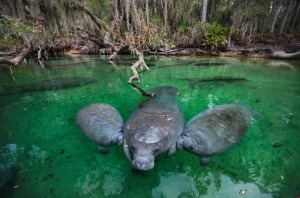Recently there’s been a lot of debate as to whether or not Florida manatees need their endangered status lowered. In a world where we’re losing thousands of species every year, and ecosystems are continuously destroyed due to human encroachment, this is a big deal.
As always, there are opposing sides – those that wish to keep the manatee under it’s current strict protection status, or to take the current population into consideration and lower their status.
With a record number of species being lost each year, monitoring and protecting endangered species plays a huge role in conserving what we still have before it’s too late. Succeeding in this is an accomplishment that is met with rising numbers in the population of a species and lessening the fear that they could be lost.
Manatees, averaging nearly ten feet long and 2,200 pounds, have come a long way. While there were only several hundred documented in 1967, today nearly 5,000 roam Florida waters. Although this is great news, it rises some new questions. Should they still be considered endangered?
The main opposition to the manatee’s endangered status seems to be coming from boating groups, primarily a non-profit called Save Crystal Lake. Their argument is simple – the numbers have risen to a high enough amount that they’re no longer facing the threat of extinction. This, by definition, should remove them of their endangered status. The manatee’s status causes a series of issues amongst the boating community, who have restrictions and reduced speeds in areas that manatees are frequently found. Many would like these boundaries to be terminated, as they feel that their impact on the population would not be large enough to warrant it.
Others are very upset with this, going so far as to claim that they feel that if boaters are so concerned about going faster, then they can go elsewhere and go as fast as they’d like without running manatees over. The local population, despite restrictions, is still often seen with wounds and the occasional casualty caused by boat propellers and discarded fishing debris.
Another argument they provide is that although the population has risen immensely over the years, there’s still no questioning that their habitat is unsafe, particularly due to human encroachment, and fatality rates would rise quickly as soon as their status dropped. Not to mention the red tide, which can easily kill of hundreds of the frail manatees in a single night. Even if their population is currently at a larger point than ever in the last 60 years, their natural habitat is still unstable and reducing their status to threatened could be the tipping point to send them back down to where they started in 1967.
The process of changing a species status is a lengthy one, so for the time being, they’re still considered endangered. But when the United States Fish and Wildlife Service makes their decision, who will get what they want? Will the numbers prevail and lower them to threatened, or will their unstable environment keep them protected at the level they are today?
Only time will tell.
-Catrina Miccicke
Further reading:
http://abcnews.go.com/US/wireStory/manatees-lose-endangered-species-status-25172088
Photo credit: Paul Nicklen

